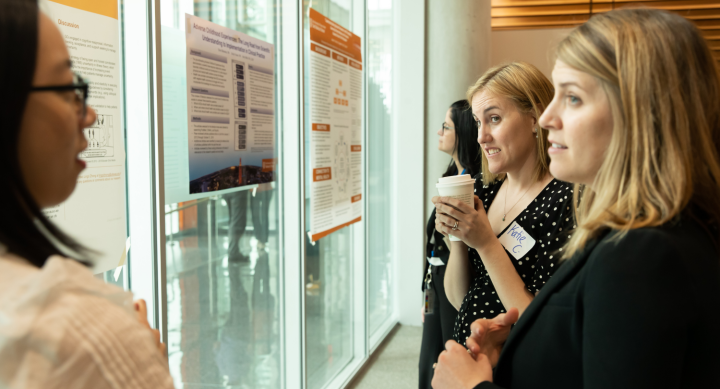
Mental Health and Health Communication Symposium: Reflections on New Possibilities
03/13/2019
It’s been a couple of weeks since the CHC hosted its Mental Health and Health Communication Symposium. The symposium was part of a 2-year theme on mental health and health communication, which was intended to invite in new partners from around UT-Austin and the community to engage at the intersection of mental health and health communication.
As the first year of this theme has progressed, it has exceeded my expectations. The CHC has made connections with new faculty, students, and community partners since announcing the theme heading into the fall semester. We had never hosted a symposium quite like this, but we had an agenda we were excited about — a 3-hour grant flash funding competition in the morning, a student poster session, and a series of speakers and panels that would bring together people with a range of experiences and perspectives working at the intersection of mental health and health communication.
One of the most exciting elements of the day was the chance to experiment with a flash funding competition. Teams had three hours to write a grant in the morning, and by the end of the day we would be able to award funding to teams led by UT-Austin faculty, staff, and students. We were incredibly impressed by the proposals of all the teams who participated, but in the end made awards to three teams:
- Designing Communication Processes for the Use of Psychiatric Advance Directives as Resources for the Patient-Centered Management of Mental Health Crises (Dr. Virginia Brown, Department of Population Health; Dr. Jorge Almedia, Department of Psychiatry; Dr. Joshua Barbour, Department of Communication Studies; Billy Table, Department of Communication Studies)
- The Role of Communication in the Mental Health and Wellbeing of Families Separated by Deportation (Dr. Carmen Valdez, Department of Population Health; Dr. Anita Vangelisti, Department of Communication Studies)
- Impacts of Partner Confirmation on Daily and Relationship Functioning of Depressed Partners in Committed Romantic Relationships (Lingzi Zhong, Department of Communication Studies; Yiwei Wang, Department of Communication Studies)
We’re excited about the research proposed by each team and look forward to seeing what they discover in their work. All of their projects should advance the evidence base around mental health and health communication and could also translate to implications in practice and policy.
The afternoon speakers offered a range of perspectives on mental health in everything from the way psychiatrists are trained to communicate with patients to the depictions of mental health and illness in the mass media. I know I left the day with new energy for this theme and hopeful about the potential for new collaborations in this area. We hope this theme will continue to bring new people to the CHC, so if this is of interest reach out and join us!

